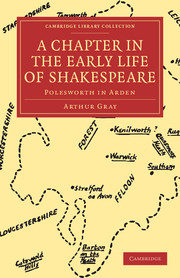Book contents
- Frontmatter
- Contents
- ILLUSTRATIONS
- SECTION 1 The Problem stated
- SECTION 2 The Marlowe fiction
- SECTION 3 The Greenwood theory
- SECTION 4 The Stratford legend
- SECTION 5 Does Shakespeare rail?
- SECTION 6 William Shakespeare, gentleman
- SECTION 7 Concerning Genius
- SECTION 8 Stratford fact and fable
- SECTION 9 The flight to London
- SECTION 10 Shakespeare's silence about Stratford
- SECTION 11 Concerning Arden
- SECTION 12 Of Poets, Patrons and Pages
- SECTION 13 What happened in 1572
- SECTION 14 Polesworth
- SECTION 15 Shakespeare in North Warwickshire
- SECTION 16 Shakespeare's road to London
- SECTION 17 Michael Drayton
- SECTION 18 The Polesworth circle
- SECTION 19 The Gooderes
- SECTION 20 The Sonnets
- SECTION 21 Southampton
- SECTION 22 Warwickshire scenes in Shakespeare's youth
- SECTION 23 The last days
- Plate section
SECTION 8 - Stratford fact and fable
Published online by Cambridge University Press: 07 September 2010
- Frontmatter
- Contents
- ILLUSTRATIONS
- SECTION 1 The Problem stated
- SECTION 2 The Marlowe fiction
- SECTION 3 The Greenwood theory
- SECTION 4 The Stratford legend
- SECTION 5 Does Shakespeare rail?
- SECTION 6 William Shakespeare, gentleman
- SECTION 7 Concerning Genius
- SECTION 8 Stratford fact and fable
- SECTION 9 The flight to London
- SECTION 10 Shakespeare's silence about Stratford
- SECTION 11 Concerning Arden
- SECTION 12 Of Poets, Patrons and Pages
- SECTION 13 What happened in 1572
- SECTION 14 Polesworth
- SECTION 15 Shakespeare in North Warwickshire
- SECTION 16 Shakespeare's road to London
- SECTION 17 Michael Drayton
- SECTION 18 The Polesworth circle
- SECTION 19 The Gooderes
- SECTION 20 The Sonnets
- SECTION 21 Southampton
- SECTION 22 Warwickshire scenes in Shakespeare's youth
- SECTION 23 The last days
- Plate section
Summary
Of Stratford, where Shakespeare is supposed to have passed the first twenty-five years, or so, of his life, something it is unavoidable to say. So much has already been written about it that I shall, as far as possible, avoid repetition.
It was a place of minor consequence, even in Warwickshire. It had no history. As a centre of trade and population it did not compare with Coventry. It had no lordly castle such as that which dignified Warwick. There had never been any important monastic house in or near the town. No magnate or county gentleman had his residence there. No inhabitant had ever distinguished himself in letters or in national affairs. Vervecum patria: it was a pelting place whose wisest talk was of fells and tods of wool and the price of ewes.
It had a school, which was much as other schools in the county, but not as Coventry, where Philemon Holland once taught and where George, Lord Berkeley and probably Marston, the dramatist, were once pupils. How little the leading inhabitants profited by its existence is shown by the fact that of nineteen persons (ten of them aldermen) who signed a paper relating to one of their body, seven only could write their names. John Shakespeare, William's father, was one of the illiterate majority. In the Legend a good deal is made of the maternal influence on the young poet.
- Type
- Chapter
- Information
- A Chapter in the Early Life of ShakespearePolesworth in Arden, pp. 36 - 40Publisher: Cambridge University PressPrint publication year: 2009First published in: 1926

